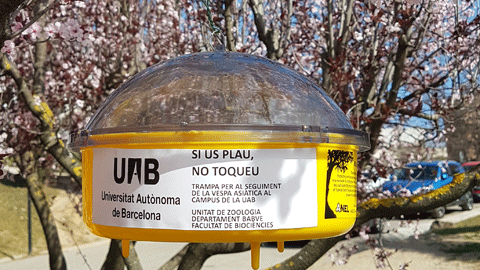Practical study on Asian hornet to commence at the UAB
The Zoology Unit of the Department of Animal Biology, Plant Biology and Ecology will develop an on-campus detection and capture campaign of Asian hornet queens in collaboration with students from the bachelor's degree in Environmental Biology.

The presence of this invasive species here has many negative effects on bee keeping, given that they prey on honeybees, but also because they prey on other pollinators found in meadows and wild flowers. The species also has an effect on public health by creating a perception of insecurity among the population due to the risk of being stung.
For this reason, the Department of Animal Biology, Plant Biology and Ecology (BABVE) will be working in a practical study on the on-campus plague here at the UAB as part of the Resource Management of Animals and Plagues (GRAP) subject of the bachelor's degree in Environmental Biology. A group of students led by subject lecturers, will begin a detection and capture campaign of Asian hornet queens. The objective of this campaign is to detect the presence of queens and eliminate the largest number possible of hornets which could create new nests on campus, thus helping to avoid the risks they represent in populated areas and the proliferation of this invasive species.
From March to the end of May, several traps will be installed around campus to capture the Asian hornet queens. These traps are made to capture the queens and will not pose any risk to people, since once the hornets are inside, they cannot get out. In order for the campaign to be effective, it is very important for all members of the university community to respect and not manipulate any of the traps.
The UAB, with Sustainable Development Goals
Life on land